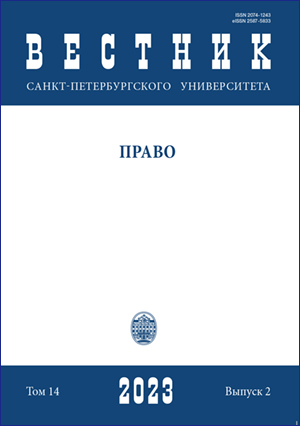Social parents and social upbringing of a child in legal discourse
DOI:
https://doi.org/10.21638/spbu14.2023.217Abstract
The article presents the author’s judgments about such a “manifest” concept for the family legal reality as social parents. In the status of a theoretical construction, it is often included in legal discourse, but the sign of sociality accompanying it is deprived of proper analysis by family law science. Interpreting sociality in the context of social reality, each author sees in it his own hypothesis of social (kinship, parent, child rearing). This approach has led to a significant scientific omission, concluded in the fact that the child-parent branch of family law includes counterterrorism, which has no connection and an understandable relationship with the concept of “persons recognized by parents at the direction of the law”. The correlation of the concept of “social parents” with such concepts of this series looks no less vague: the rights and obligations of parents; persons replacing parents; other persons in whose care the child is. The conclusions of the article reflect the author’s scientific views on the problem posed by him and consist in the following: the presence of obvious social grounds for the introduction of new parental concepts into the space of family law should not harm the academic maxim about the inadmissibility of separating existing legislation. Following the goal of strengthening its integrity and internal logic, the doctrine will have to identify social parents in the space of law not only from the standpoint of the usefulness of their social role, but also in the sense of correlation with already known normative constructions; scientific success in cognizing the semantic essence of the theoretical construction “social parents” can be achieved provided that cognition is not organized as an autonomous problem that exists “by itself ”, but in connection with the existing legal knowledge about parents “by law”; in the doctrinal construction of “social parents”, a significant theoretical resource is reserved, which is able to make such latent legal concepts as the actual father/mother, stepfather/stepmother, and actual educator scientifically relevant.
Keywords:
sociality in law, social parenthood, theoretical construction, the state of actual parenthood, stepparents, the actual upbringing of a child
Downloads
References
Downloads
Published
How to Cite
Issue
Section
License
Articles of "Vestnik of Saint Petersburg University. Law" are open access distributed under the terms of the License Agreement with Saint Petersburg State University, which permits to the authors unrestricted distribution and self-archiving free of charge.






